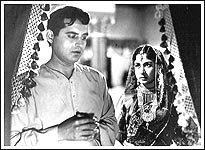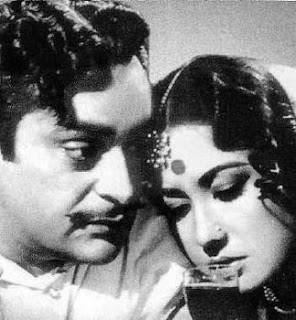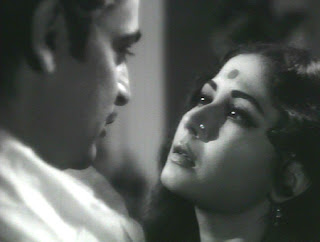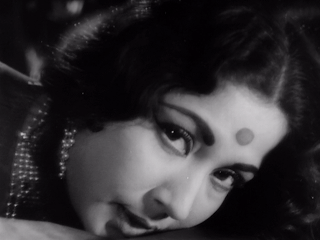 One thing that I learned early on in my life is that the world is not static. Times change and with the changing seasons of Time, everything changes. Humans change, Civilizations change, Societies with their sacrosanct Customs and Traditions change, Thoughts change, the notions of what's Good and Bad change – What is man, even Gods and Religions Change. Nothing remains constant here. Absolutely Nothing .... What doesn’t change though is the incessant march of Time. Time marches on – irrespective of everything.
One thing that I learned early on in my life is that the world is not static. Times change and with the changing seasons of Time, everything changes. Humans change, Civilizations change, Societies with their sacrosanct Customs and Traditions change, Thoughts change, the notions of what's Good and Bad change – What is man, even Gods and Religions Change. Nothing remains constant here. Absolutely Nothing .... What doesn’t change though is the incessant march of Time. Time marches on – irrespective of everything.Empires rise from dust, rule the roost and then again fall back to dust. Nothing remains – nothing except the ruins of those glorious heydays and even they fall one day, blown to smithereens by the ruthless forces of time, unsung and unloved, victims at last to the vicissitudes of time leaving only distant memories of what was ….
As the great poet Ahmed Faraz said:
Abke Bicchde To Shaayad Kabhi Khwaabon Mein MilenAnd so it was with the powerful Thakurs and the Zamindars in the final years of the 19th century and the early 20th Century.
Jis Tarah Sukhe Huye Phool Kabhi Kitaabon Mein Milen
Created and indulged ad infinitum by their British overlords with a view to perpetuate their power and strength in an alien and often hostile country and to ensure consistent healthy cash inflows in their coffers in accordance with the Permanent Settlement Policy initiated by Lord Cornwallis in 1793, these puppets of British power once reigned supreme over the poor teeming millions. And as is often common with the class that is on the ascendant, in the intoxication of power and potency, they perpetuated atrocities and heaped humiliations on the ones that fell to their mercy. No Crime was beyond their pale; no tyranny beyond their power and miseries of the poor and the defenseless continued unabated. But nothing remains constant and as time changed it's colours yet once again even they had to fade away.
Sahib Bibi Aur Ghulam is a movie that captures vividly in stark deep colours the terminal fall of a Zamindar family into terminal chaos. It is a heart-wrenching chronicle of the beginning of the end of the feudal dream in Indian conditions but more than that, it’s also a strong and caustic look at the conditions that brought up this downfall.
The greatness of the movie, (difficult though it may seem to present two strands of life simultaneously), lies in the fact that the movie not only captures the decline of the feudal powers of Bengal but also presents a searing account of the plight of womenfolk in those prestigious houses of culture and civilization.
These were Houses, where womenfolk were worshipped as avatars of Goddess Durga but treated as worse than daasis – where every act was performed invoking the name of the Mother Goddess but the women did not have the freedom of choice over their own feelings – so well has this been brought out by the movie that can only shudder to imagine this duplicity and our heart goes out in unison to what must have transpired behind those beautiful walls decorated with Dhaka Muslin.
On yet another level, the movie also portrays the beautiful relationship that develops between a woman of the royal household (the Bibi) and a poor rustic (the Ghulam) in shades that are so simple... just like broad swathes of brilliant, playful colours on the dark, brooding canvas of life but too complex to be understood completely. To call it platonic is to state the obvious but the relationship of the Ghulam with his Bibi cannot be explained away by these metaphors.... there is a starkness to the relationship that defies simpler understanding and as such cannot be explained totally in terms of what is but has to imagined of what it can be.....
The title is intriguing ... Why is this film called Sahib, Bibi Aur Ghulam - a reference to the 3 most powerful cards in the pack of cards excepting the Ace? Maybe because the three principal characters in this tragical drama behave like the 3 cards in their normal interactions....He is the Sahib - because he is the Master of all he surveys - though he may be disadvantaged in the absence of supporters, he is still the Master - unbending and unready to accept any change to his privileged status - like a man trapped in his own ivory tower, a relic of an age that's passing away.
She is the Bibi - shorn of all real power but an ornament of the Sahib - she derives her power from the majestic allure of her consort without being by herself an equal and as a result of this unequal share in power is forever relegated to the mercy of the provider .... Remember, the name is Bibi not Memsahib .... thus according a reflected glory but no real power worth the name
And He is the Ghulam - one who can see not beyond the radiance that emanates.... one who can feel the misery but is drawn moth-like to the flame of a dying flicker.... Overpowered by the awe and the radiance and finding an emasculated empowerment at the hands of those who themselves are playing their last losing hand at the game of fate but refusing to accept that the world has past them by, the Ghulam continues to be the last vestige of their Pride and Prestige.
Indeed the movie lives to the promise of the title - an impressive task! a great accomplishment!
 As Bhootnath (the Ghulam), a rustic who migrates to
As Bhootnath (the Ghulam), a rustic who migrates to
From the initial stages of innocence when Bhootnath enters  Guru not only manages to stand true to the story but also to stand tall and dignified in the ruins of a destroyed past. His deep affection for Chhoti Bahu is not only well displayed but so is his frustration on his own inability to help her out of her predicaments. Look at the scene, where despite himself and against better judgement, he proceeds to snatch liquor from the hands of Chhoti Bahu because he cannot see her self-destructing and then the frustration at having to face an extraordinary reaction and be unable to do anything is a three course act in education for a person who wants to learn acting.
Guru not only manages to stand true to the story but also to stand tall and dignified in the ruins of a destroyed past. His deep affection for Chhoti Bahu is not only well displayed but so is his frustration on his own inability to help her out of her predicaments. Look at the scene, where despite himself and against better judgement, he proceeds to snatch liquor from the hands of Chhoti Bahu because he cannot see her self-destructing and then the frustration at having to face an extraordinary reaction and be unable to do anything is a three course act in education for a person who wants to learn acting.
It’s very rare to find an actor who can seep into a role to such an extent that one feels not so much for as a character but for the entire class that the actor personifies. Guru Dutt had that rare quality. Look at those eyes surveying the falls and then chancing upon the dead remains of the assassinated Chhoti Bahu, the pain can be felt and it scorches the soul... have we seen such a strong body language ever? The pain numbs us and for an momentary instant we can feel that heart-breaking moment when time just stands still and tears flow not from the eyes but from the heart!
Rehman as Chhote Zamindar (the Sahib) is aptly and perfectly cast as the aristocratic scion of a royal family and stands tall in his perfect portrayal of a man who is arrogant, egoistic, pompous and - worthless. Watching his role unfold, you feel a quite sense of revulsion for the Zamindars, everything that was deplorable can be seen in his character.... I still feel a sense of revulsion when he asks Chhoti Bahu “Sharab Pi Sakti Ho Meri Khhatir?”
What kind of a husband would draw his wife to such pain and frustration! It disgusts you and you feel it to the core of your heart....
 But the great actor that he was, he still manages to engage our empathy in the final scene wherein he is lying on the bed as a paraplegic, highly repentant but also aware of the futility of the repentance.
But the great actor that he was, he still manages to engage our empathy in the final scene wherein he is lying on the bed as a paraplegic, highly repentant but also aware of the futility of the repentance.
Like a Dr. Frankenstein who after creating his monster is forced to look at his creation with pain and chagrin, so is this man forced to see his adoring and faithful wife self-destruct for his whims and fancies.  Through him, one can see the long ride of his clan towards the impending doom and the irreversible destruction of his dynasty.
Through him, one can see the long ride of his clan towards the impending doom and the irreversible destruction of his dynasty.
Watch his eyes as he observes Choti Bahu in her drunken stupor and observe it wincing with disgust and frustration as he recalls how responsible he is for her destruction. A scene that could only have been accomplished by an extra-ordinary actor – a silent reminder of Rehman’s calibre and finesse
Although both the actors mentioned above are brilliant, the movie scores mainly because of a tour-de-performance by one of the greatest actresses of Hindi Cinema, the tragedy queen – Meena Kumari who as Chhoti Bahu (the Bibi), the flawed but spirited bahu of a feudal household delivers one of the greatest performances by an actress ever.
The role of Chhoti Bahu is not a caricature of the times, but one that requires a deep understanding of the period and the customs and traditions of the time, it has to understand the feelings of a woman brought up on the moralities of that bygone era, the pining of a woman thirsting for her husband’s attention, the frustration of sexual desires kept unfulfilled and the deep sense of anguish and gloom that drives a woman into acts against her ingrained nature. In one such scene as she screams to her consciousness, “ Hindu Ghar ki bahu hokar, kya sharab pee hai kissine?” one is bound to feel and cry in unison with her on her deep sense of loss, despair, anguish and frustration.
 Some scenes that just refuse to go away and are seared in ones consciousness forever are scene where she confronts her husband and then as the ruthless words strike home, one can just remain nothing but amazed at the transformation - look at the way the determination on her face giving way to her helplessness when being forced to drink alcohol, the scene of frustration when she’s unable to hold on to her husband despite all her efforts and the final scene where she still maintains her dignity although she knows all is lost.
Some scenes that just refuse to go away and are seared in ones consciousness forever are scene where she confronts her husband and then as the ruthless words strike home, one can just remain nothing but amazed at the transformation - look at the way the determination on her face giving way to her helplessness when being forced to drink alcohol, the scene of frustration when she’s unable to hold on to her husband despite all her efforts and the final scene where she still maintains her dignity although she knows all is lost.
And who can forget, the introduction of Chhoti Bahu – never has an actress been introduced so effectively ever and Meena looks so ravishingly beautiful – that’s just before you stop looking at Meena and start looking at Chhoti Bahu! Only she could be so majestic while imploring her husband with these lines, “Main Aur Bahuon Ki Tarah Nahin Hoon, Jee!” Sheer Magic!
 Waheeda Rehman as Jabba, the spitfire daughter of a city businessman proves her mettle in a role that is a compliment on her performance. This is one of the few challenging roles that came Waheeda’s way and the actress not only grabs it with both her hands but also uses it to demonstrate her grasp on the finer nuances of acting.
Waheeda Rehman as Jabba, the spitfire daughter of a city businessman proves her mettle in a role that is a compliment on her performance. This is one of the few challenging roles that came Waheeda’s way and the actress not only grabs it with both her hands but also uses it to demonstrate her grasp on the finer nuances of acting.
If you look closely, the character of Jabba is not incidental to the plot but it’s the presence of her character that adds a touch of deep melancholy to the lead role of Meena Kumari since both in conception and execution, Jabba is all that Meena would have been had Fate so dictated whereas Chhoti Bahu is all that Waheeda would be in circumstances such as the ones encountered by Chhoti Bahu. Look at the way she teases Bhootnath off and again and then contrast it with her demeanour once she knows the truth – indeed it’s fate that dictates at time what we could be and what we have become.
is not incidental to the plot but it’s the presence of her character that adds a touch of deep melancholy to the lead role of Meena Kumari since both in conception and execution, Jabba is all that Meena would have been had Fate so dictated whereas Chhoti Bahu is all that Waheeda would be in circumstances such as the ones encountered by Chhoti Bahu. Look at the way she teases Bhootnath off and again and then contrast it with her demeanour once she knows the truth – indeed it’s fate that dictates at time what we could be and what we have become.
Look at her eyes as she sings “Meri Baat Rahi Mere Mann Mein” and you can feel her own impotence at times in a society that refuses it’s women the right to speak and choose.
The supporting cast also stands true to its mettle. Nasir Hussein is brilliant in his portrayal of the elegant and dignified Subhinay Babu. Dhumal brings life to his portrayal of a servant without seeming cheesy while Sapru conveys the regal elegance of a Zamindar effortlessly. Hridaynath Chattopadhyay impresses as Ghadi Babu - a mad man who is used as a metaphor for changing times
Hemant Kumar wields the baton impressively, creating in the process some of the best Geeta Dutt & Asha Bhosle ditties. Whether it’s the haunting “Koi Door Se Aawaz De”, the mischievous “Bhavra Bada Nadan”, the passionate “Naa Jao Saiyan”, the sad “Meri Baat Rahi” or the hopeful “Piya Aiso Jiya Mein” the maestro ensures that each and every song remains deeply etched in your hearts. It goes without saying that Shakeel Badayuni has penned in some of the best songs of his glittering career in this movie.
One has to only listen to “Piya Aiso Jiya Mein” to understand the innate sexual feelings of a woman preparing to meet her husband – and then on the other side of the spectrum we have “Koi Door Se Aawaz De, Chale Aao” – what can signify sexual and emotional frustration better than this?
Raat Raat Bhar Intezaar Hai, Dil Dard Se Be-Qaraar HaiAdd to this mosaic, the painful but strong “Naa Jao Saiyaan”…. Can the requests of a wife be more sweeter or more heart-breaking?
Sajan Itna To Na Tadpaao, Chale Aao
Aas Todke Mukh Modke, Kya Paoge Saath Chhodke
Birhan Ko Ab Yun Na Tarsaao, Chale Aao
This is Geeta Dutt’s album – never has this great songstress been more beautifully used. Her voice effectively captures both the longings, the feelings and the frustration of Chhoti Bahu – sometimes it appears as if Geeta Dutt was born only to give voice to Chhoti Bahu and Meena Kumari was born only to play Chhoti Bahu – although the truth remains that both have given many more such strong performances.
Abrar Alvi in his maiden directorial debut creates a fascinating spectacle of grandeur and debauchery, exaltation and meanness. He effortlessly portrays the complex relationship of Meena and Guru Dutt and etches out the deep respect and love the two hold for each other while still managing to keep both Rehman and Waheeda Rehman firmly in the scene.
Although, at times the film displays the famous style of Guru Dutt, it would be unfair to say that Guru Dutt ghost-directed the movie. Some of the scenes in the movie such as the pigeon competition, the murder sequence and the bomb blast are not the sorts of scenes Guru Dutt would be comfortable doing. However, the picturizations of songs and the close-ins are definitely reminiscent of the master. Special mention should be made of V K Murthy, whose cinematography is one of the highlights of the movie.
And lastly we need to appreciate Abrar for one more thing – his deft adaptation of the classic. Adaptation of a literary work is no easy task. It’s like taking the vision and the dream of one man and trying to transplant it into another milieu – here the mind of another writer.
The Waterloo of many an accomplished writers and directors is met when trying to adapt a literary work of repute on celluloid for as any avid reader of literature will concur, these do not easily give themselves to adaptation. This is more so with the classics. And if the classic is based on a period of Indian history that’s known for the unmitigated tyranny of a privileged class over the teeming millions, it becomes even more difficult. And if the intent of the classic is to capture vividly their decline, it’s almost a difficult task.
Such was Bimal Mitra’s brilliant exposition of the turbulent times that an adaptation of the novel would be hara-kiri even for seasoned campaigners but it’s to the credit of the cast & crew that this adaptation was an out and out classic – a worthy adaptation of a worthy work. In fact, Sahib Bibi Aur Ghulam is one of the few adaptations that can be considered to have actually outshone the classic – the rare case where an adaptation has actually managed to outshine the original.
This movie is a wake-up call for those who think Indian literature is shallow and does not have enough stories for those who would dare to adapt them.
I would just end it by saying....
Koi Door Se Aawaz De... Chale Aao
We need more movies like this .... please!



















